Balsamic Vinegar Benefits, Nutrition Facts, And Side Effects
Use it to lend a delectable complexity to your salads and enjoy all its health benefits.
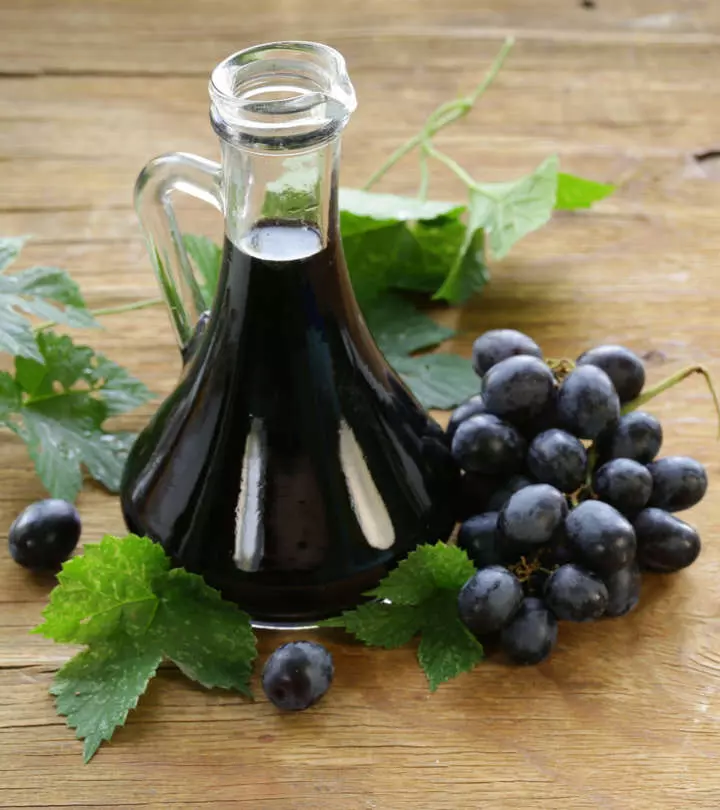
Image: shutterstock
Balsamic vinegar is fast getting popular as a salad dressing. While the tangy and sweet flavor is one reason, the health benefits of balsamic vinegar could be another. This fruit vinegar is made from fermented grapes and has an intense dark color. It is primarily used in Italian cuisine for its unique flavor as a condiment and a dressing. Keep reading to know about the health benefits of balsamic vinegar, its preparation methods, recipes and more.

 Know Your Ingredient: Balsamic Vinegar
Know Your Ingredient: Balsamic VinegarWhat Is It?
It is a dark, flavored, concentrated solution made of crushed grape juice, seed, and stems.
What Are Its Benefits?
It may protect from oxidative damage, lower cholesterol levels and blood sugar, reduce weight, and promote skin health.
Who Can Consume It?
All can safely consume it.
How Often?
You can consume 1-2 teaspoons of balsamic vinegar every day.
Caution
Avoid consumption if you feel irritation in your throat and tongue, stomach ache, or heartburn.
In This Article
What Is Balsamic Vinegar?

Balsamic vinegar is an intensely flavored vinegar that is prepared by cooking grapes. The vinegar is fermented both aerobically and anaerobically. It is very dark and is mostly used for salad dressings. Read on to know more about the nutrition facts and health benefits of balsamic vinegar.
 Trivia
TriviaKey Takeaways
- Balsamic vinegar not only adds flavor to your Mediterranean dishes but can also be beneficial for your health.
- Natural balsamic vinegar is free of preservatives and low in natural sugar.
- So, you can easily include it in various weight loss diet options.
- You can also make balsamic vinegar at home to avoid artificial colorants and added sugar.
Balsamic Vinegar Nutrition Facts
One tablespoon of balsamic vinegar contains the following nutrients:
- Calories: 15 kcal
- Protein: 0 gram
- Fat: 0 gram
- Carbohydrates: 2.7 grams
- Fiber: 0 gram
- Potassium: 18 milligrams
Continue reading to know more about the health benefits of balsamic vinegar.
Health Benefits Of Balsamic Vinegar
1. May Help Decrease LDL Cholesterol
Balsamic vinegar was found to effectively inhibit the accumulation of lipids and significantly reduce LDL cholesterol (bad cholesterol) levels and triglyceridesi These are the lipids (fats) that are present in your blood and are either produced by your body or obtained from your diet. . In addition, it was also shown to improve the HDL – LDL cholesterol ratio. However, excess consumption should be strictly avoided to avoid any undesirable side effects.
2. May Protect From Oxidative Damage
A study has shown that balsamic vinegar is rich in antioxidants. Research states that antioxidants have many beneficial effects on one’s overall health. They are especially known to combat the effect of oxidative damage by free radicals, which are linked to many diseases. Antioxidants are also proven to have anti-cancer and anti-aging properties.
3. May Help Manage Blood Glucose Levels
has shown that fruit-based vinegar may decrease blood glucose levels to some extent. However, the exact mechanism remains unclear. You may still use balsamic vinegar to manage your sugar levels after consulting your doctor.
4. May Help Manage Obesity

Vinegar is particularly known for its acetic acid content. Research has shown that acetic acid in vinegar may have an anti-obesity effect. Some studies have shown that fermented foods like vinegar exhibit anti-obesity effects by altering the gut microbiotai These are the microorganisms such as bacteria, fungi, archaea, and viruses that dwell in the digestive tracts of animals. composition. They also were found to reduce food intake, lipid deposition, and body weight.
Additionally, anecdotal evidence suggests that acetic acid inhibits fat storage and also promotes fat loss. However, the exact mechanism remains unclear and more research is warranted in this regard.
5. May Help Promote Skin Health

Anecdotal evidence suggests that balsamic vinegar may promote skin health. This vinegar has antioxidants proven to promote skin health. They have many beneficial effects on the skin and help reduce the signs of photodamage and skin aging. However, balsamic vinegar is not recommended to be directly applied to the skin. Its high acidity may cause reactions in some. You may want to dilute it with water before using.
While it has important health benefits, balsamic vinegar may have a strong taste. But slight modifications can enhance its flavor and minimize its pungent taste. Continue reading to know how to prepare it at home.
How To Prepare Balsamic Vinaigrette At Home
While balsamic vinegar can be used directly as a salad dressing, you can also try out balsamic vinaigrette (what it is called after the modifications). The vinaigrette typically contains some added sugars and oils that act as a flavor enhancer and has various culinary uses.
Kris Keppeler, a blogger, had her perception of vinegar transformed during a three-week stay in Italy when balsamic vinegar became a culinary revelation. She writes, “Balsamic vinegar in Italy is like ketchup here in the US. People put it on everything (i).” Amazed by its versatility, she discovered its compatibility with fruits and salads. Kris’s love for balsamic vinegar led her to create a low-calorie, flavorful salad dressing, enhancing greens with a tangy, sweet twist.
Here is how you can prepare balsamic vinaigrette at home.
What You Need
- ¾ cup of extra virgin olive oil
- ½ teaspoon ground black pepper
- ½ teaspoon of salt
- ¼ cup balsamic vinegar
Method
- Combine olive oil and balsamic vinegar in a glass jar.
- Add the salt and ground black pepper.
- Tighten the lid and shake vigorously.
- You can dip a piece of lettuce into the vinaigrette and check the taste.
- Adjust the salt, pepper, or the proportion of oil and vinegar as per your requirement.
- The oil and vinegar will separate after some time.
- Try to recombine every time before dressing your salad.
 Trivia
TriviaBalsamic vinegar can be added to any salad or recipe because of its unique taste. What are other easy ways to use it? Keep reading to learn more about it.
Usage Tips
- You can mix balsamic vinegar with olive oil, salt, and pepper for a tasty salad dressing.
- Drizzle it over roasted vegetables like Brussels sprouts, carrots, or tomatoes for added flavor.
- Use balsamic vinegar to enhance grilled meats like chicken, steak, or fish.
- You can add a splash to marinara or pasta sauces for a rich, tangy taste.
- Pair it with fruits like strawberries or peaches for a unique flavor combination.
- A few drops of balsamic vinegar can help elevate simple desserts.
Easy And Tasty Recipes With Balsamic Vinegar
1. Salad Dressing Recipe
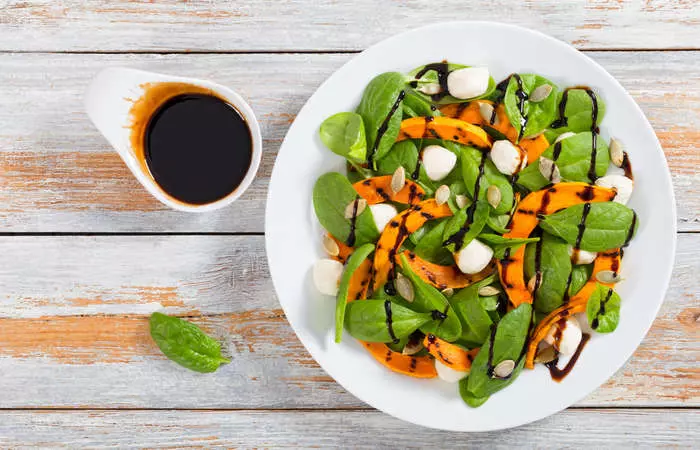
What You Need
- 4 pieces chargrilledi It refers to cooking food on a charcoal grill at a high temperature till it slightly burns and turns black. pumpkin
- 100 grams mozzarella cheese
- 1 bunch spinach
- 50 grams pumpkin seeds
- ½ cup balsamic vinegar
- 3 tablespoons olive oil
- 3 crushed garlic cloves
- Salt and pepper
Method
- Add the balsamic vinegar, olive oil, salt, and pepper to a glass jar. Shake vigorously.
- Add the crushed garlic and shake the mix once. Keep it aside.
- Add the chargrilled pumpkin pieces, spinach, and mozzarella cheese in a large mixing bowl.
- Sprinkle the pumpkin seeds and mix gently.
- Pour the mixture of balsamic vinegar dressing and mix gently.
- Consume immediately without storing it.
- You can additionally add lettuce and leafy greens to this salad.
2. Balsamic Glaze
What You Need
- 1 cup balsamic vinegar
- Honey or maple syrup
Method
- Add the balsamic vinegar and honey in a thick-bottomed saucepan.
- Place this mixture on medium heat and mix it.
- Bring it to a boil until there are bubbles in the mixture.
- Keep mixing continuously until there is a slight glaze in the mixture.
- Turn the flame to medium heat and let it simmer for 8 to 10 minutes until the vinegar is reduced to half.
- If perfectly cooked, it will form a thick coat on the cooking spoon.
- Remove from the pan and store in an airtight container after cooling completely.
- This mix can be stored in the refrigerator for 3 days.
- You also can add sugar or any other sweetener of your choice.
- You can add this balsamic glaze to salads, ice creams, or even juices for a sweet and tangy twist.
3. Balsamic Dijon Dressing
What You Need
- 1 cup chopped red leaf lettuce
- 1 cup iceberg lettuce
- 5 tablespoons Dijon mustard
- 3 tablespoons balsamic vinegar
- 4 crushed garlic cloves
- 1 teaspoon ground black pepper
- 1 teaspoon salt
Method
- Add the chopped lettuce in a mixing bowl.
- Sprinkle some salt and mix gently. Keep it aside.
- Add the Dijon mustard, crushed garlic, black pepper, and salt in a glass jar.
- Shake the jar vigorously until the ingredients are mixed completely.
- Add the balsamic vinegar and mix until it forms a semi-solid paste.
- Add this dressing to the bowl of chopped lettuce.
- Mix gently for a uniform taste.
- Consume the salad immediately without storing it.
- The Dijon mustard dressing can be stored in the refrigerator for 5 days.
- Do not freeze the dressing.
4. Caprese Salad

What You Need
- 4 ripe tomatoes
- 8 ounces of fresh mozzarella cheese
- 1 cup of fresh basil leaves
- 2 tablespoons of balsamic vinegar
- 2 tablespoons of extra virgin olive oil
- Salt and pepper to taste
Method
- Slice the ripe tomatoes and the fresh mozzarella cheese into rounds of approximately the same thickness.
- Arrange the tomatoes, mozzarella, and fresh basil leaves in an alternating pattern on a serving platter.
- Drizzle balsamic vinegar and extra virgin olive oil all over the salad.
- Season with a pinch of salt and a dash of freshly ground black pepper for added flavor.
- Serve and enjoy your delicious caprese salad.
Is Balsamic Vinegar Keto?
Balsamic vinegar can be easily added to most keto recipes. It can serve as a tasty dressing for keto salads and sautéed vegetables. It is very low in calories and is suitable for the keto diet. Natural balsamic vinegar is free of any preservatives and is very low in natural sugar. However, few contain artificial colors and sugars to mimic the appearance and taste of natural balsamic vinegar. Hence, do check for any artificial colorants or sugars before making a purchase.
Continue reading to know about the possible risks of balsamic vinegar.
Does Balsamic Vinegar Pose Any Health Risks?

So, is Balsamic vinegar safe for you? Well, it is generally safe unless one is allergic to it. When consumed in limited quantities, it serves as a tasty addition to your salads. However, anecdotal evidence suggests that few may experience the following side effects with balsamic vinegar:
- Throat Irritation: Intake of raw balsamic vinegar may irritate the throat.
- Stomach Pain: The acetic acid in balsamic vinegar may cause stomach pain in some.
- Flatulence: Balsamic vinegar may also cause flatulencei It is a medical term for the release of gas from the digestive system through the anus, and it is also referred to as farting. in some individuals. However, it generally subsides within a few hours.
- Tingling Sensation Or Swelling Of The Tongue: The acetic acid in the vinegar may irritate the tongue and cause reddish or white raised patches. At times, one may also experience a tingling sensation on the tongue that generally subsides in a day or two.
- Heartburn: The low pH value of balsamic vinegar may trigger heartburn after consumption. Hence, people with GERD should try to avoid its intake in any form.
Most of these side effects are generally mild and usually subside within a day or two. Hydrate adequately to manage the symptoms. However, if symptoms persist even after 3 days, consult your doctor without further delay.
Infographic: 5 Surprising Health Benefits Of Balsamic Vinegar
If you believe that balsamic vinegar is just a posh drizzle for salads and pasta, think again! This tangy, dark, and flavorful condiment is much more than a culinary delight. Replete with antioxidants and essential nutrients, balsamic vinegar boasts a range of health benefits. While it might be tempting to drizzle it liberally over everything in sight, its magic actually lies in moderation. The infographic below summarizes some of the key benefits of balsamic vinegar and the reasons it should get a permanent spot on your pantry shelf. Scroll down!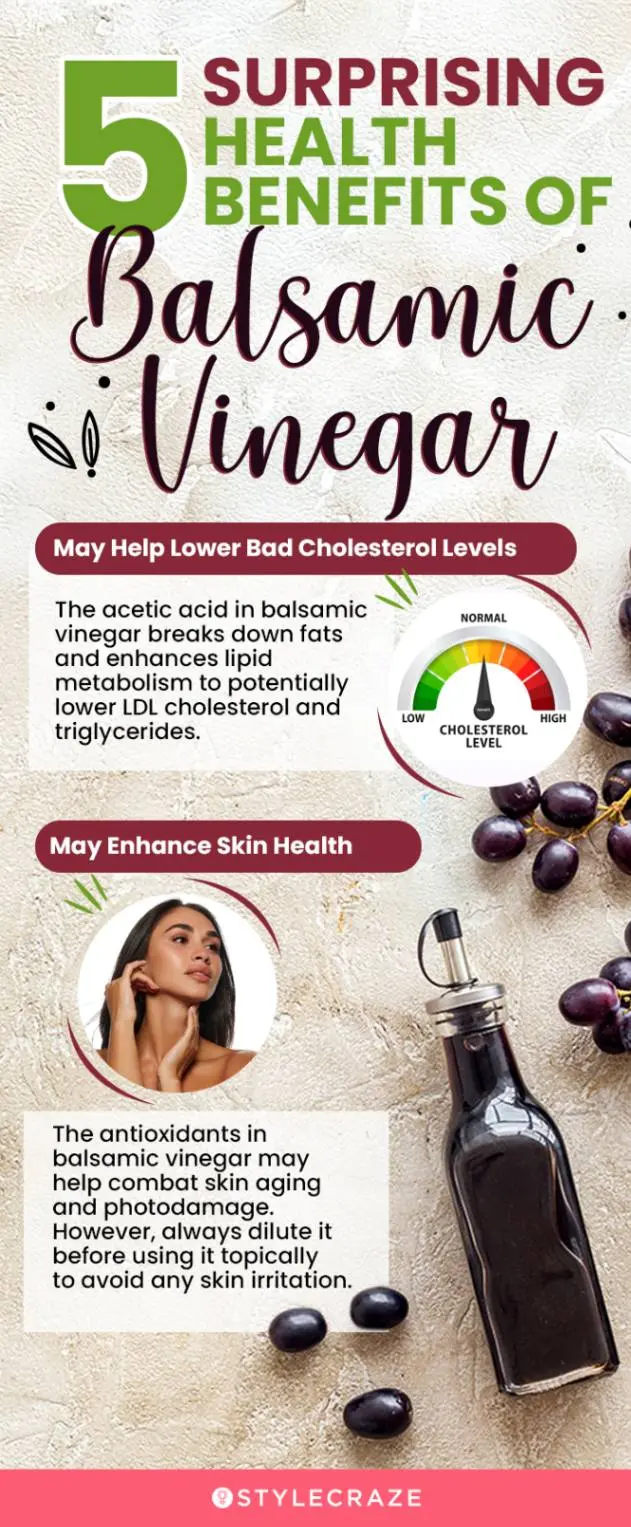
Illustration: StyleCraze Design Team
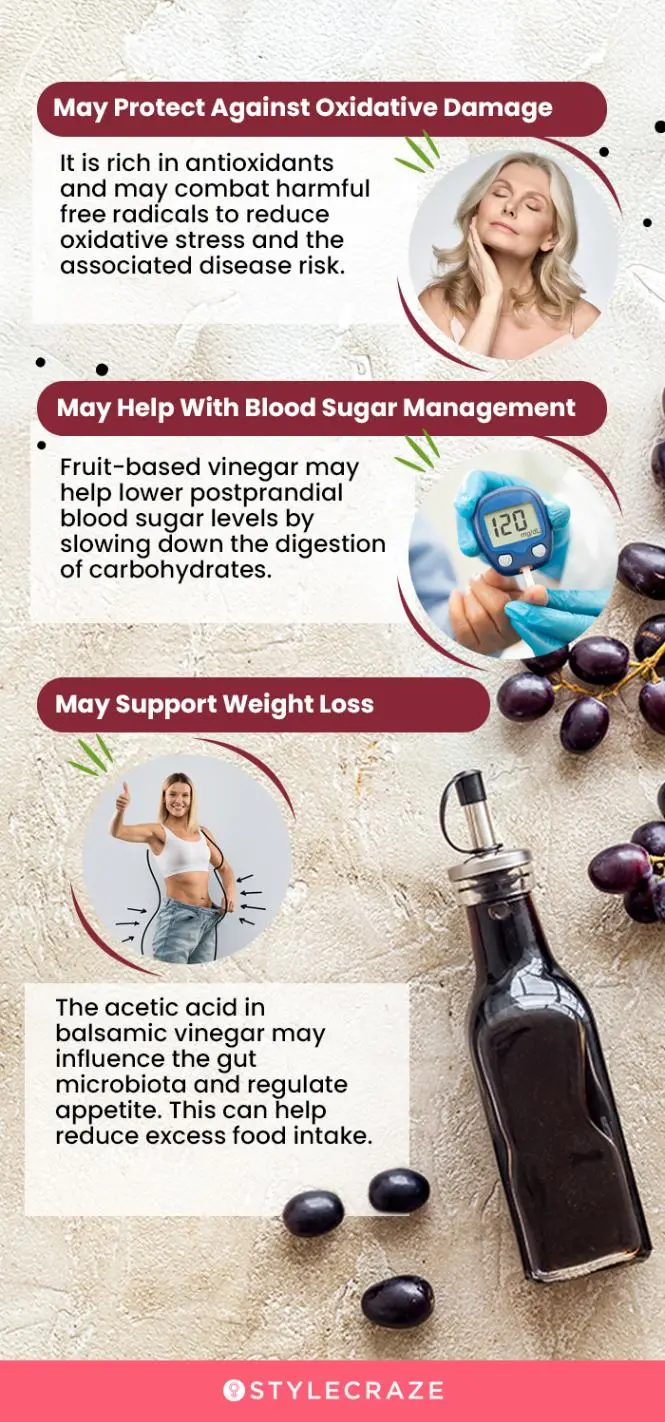
Illustration: StyleCraze Design Team
The health benefits of balsamic vinegar are slowly gaining popularity. This unique vinegar is known for the tangy taste it adds to dishes. Balsamic vinegar helps in the reduction of LDL cholesterol levels, protects from oxidative damage, helps manage obesity and blood glucose levels, and promotes skin health. You can prepare balsamic vinegarette at home with simple ingredients and use it as a salad dressing. Although this vinegar is generally safe, some people may experience throat irritation, stomach pain, heartburn, or a tingling sensation on the tongue after consuming it. Hence, caution is advised. Try out any of the recipes mentioned above with balsamic vinegar to add it to your diet.
Frequently Asked Questions
Is balsamic vinegar a superfood?
Yes, balsamic vinegar can be termed a superfood. This fruit vinegar offers an array of health benefits when included as a part of the diet.
Is balsamic vinegar good for your liver?
Yes, balsamic vinegar is good for the liver as it exhibits detoxifying properties. In addition, it also helps treat hepatitisi A liver inflammatory disorder that can be brought on by excessive alcohol intake, toxins, some drugs, and specific medical conditions. , infections, and jaundice.
Does balsamic vinegar damage teeth?
Yes, balsamic vinegar may damage teeth if not taken with caution. It can erode the dental enamel as it is acidic in nature.
Can I mix balsamic vinegar with water and drink it?
Yes, balsamic vinegar can be added to hot water for consumption. For a glass of hot water, 10 ml of this vinegar is considered ideal.
Illustration: Balsamic Vinegar Benefits, Nutrition Facts, And Side Effects
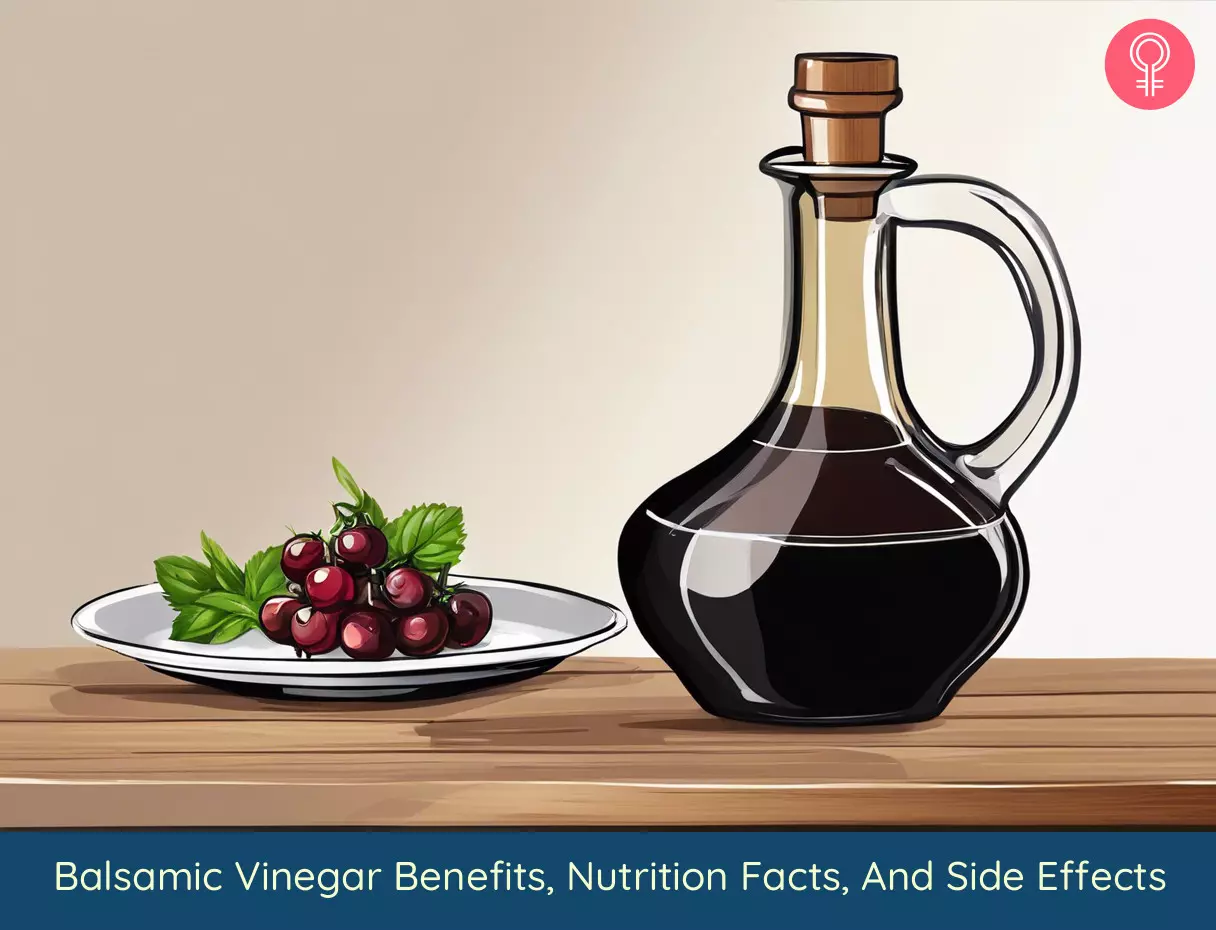
Image: Stable Diffusion/StyleCraze Design Team
Learn about the amazing health benefits of balsamic vinegar! From reducing cholesterol to aiding digestion, check out the video below to know more about this powerhouse ingredient.
Personal Experience: Source
StyleCraze's articles are interwoven with authentic personal narratives that provide depth and resonance to our content. Below are the sources of the personal accounts referenced in this article.
i. Discovering the benefits and joys of balsamic vinegar and how to use it to give your salads a snap
https://medium.com/@kriskeppeler/discovering-the-benefits-and-joys-of-balsamic-vinegar-and-how-to-use-it-to-give-your-salads-a-snap-96c98b248b6e
References
Articles on StyleCraze are backed by verified information from peer-reviewed and academic research papers, reputed organizations, research institutions, and medical associations to ensure accuracy and relevance. Read our editorial policy to learn more.
- Vinegar Metabolomics: An Explorative Study of Commercial Balsamic Vinegars Using Gas Chromatography-Mass Spectrometry
https://www.ncbi.nlm.nih.gov/labs/pmc/articles/PMC5041121/ - Vinegar Functions on Health: Constituents Sources and Formation Mechanisms
https://onlinelibrary.wiley.com/doi/full/10.1111/1541-4337.12228 - Free radicals antioxidants and functional foods: Impact on human health
https://www.ncbi.nlm.nih.gov/pmc/articles/PMC3249911/ - Diabetes Control: Is Vinegar a Promising Candidate to Help Achieve Targets?
https://www.ncbi.nlm.nih.gov/labs/pmc/articles/PMC5954571/ - Varieties production composition and health benefits of vinegar: A review
https://www.sciencedirect.com/science/article/abs/pii/S0308814616318076?via%3Dihub - Anti-obesity and anti-inflammatory effects of synthetic acetic acid vinegar and Nipa vinegar on high-fat-diet-induced obese mice
https://idp.nature.com/authorize?response_type=cookie&client_id=grover&redirect_uri=https%3A%2F%2Fwww.nature.com%2Farticles%2Fs41598-017-06235-7 - Antioxidants in dermatology
https://www.ncbi.nlm.nih.gov/labs/pmc/articles/PMC5514576/
Read full bio of Nilofar Pendhari
Read full bio of Aparna Mallampalli
Read full bio of Ravi Teja Tadimalla
Read full bio of Payal Karnik





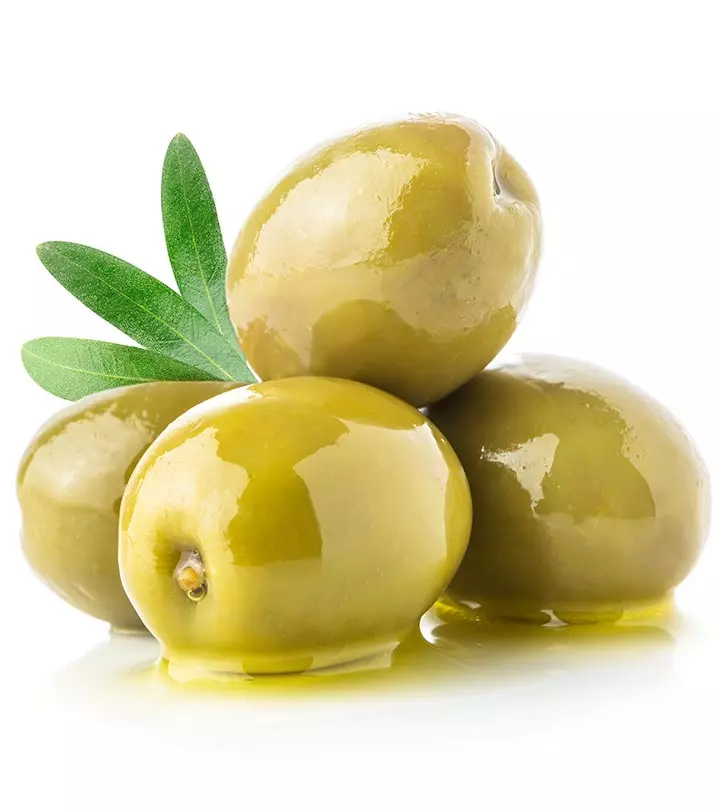

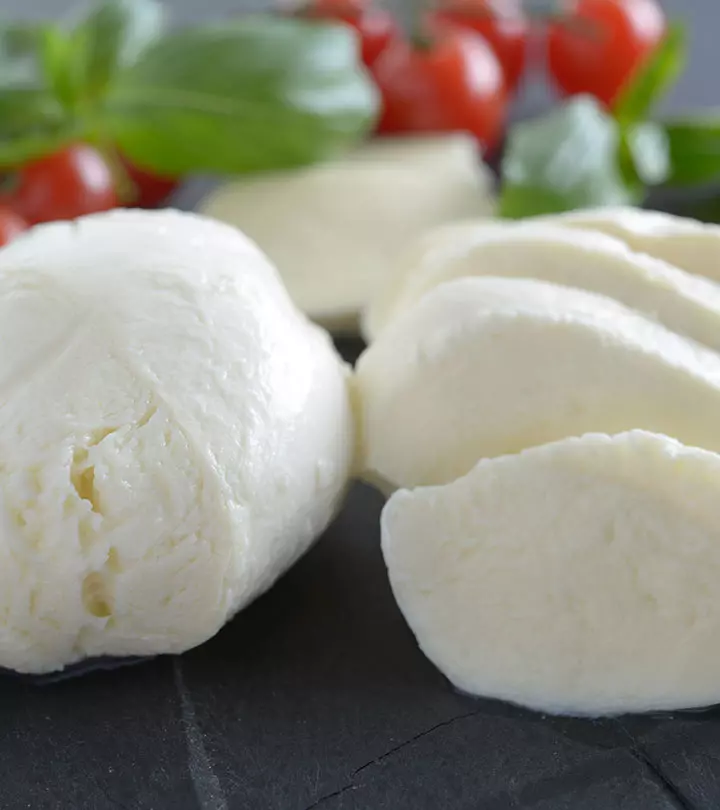
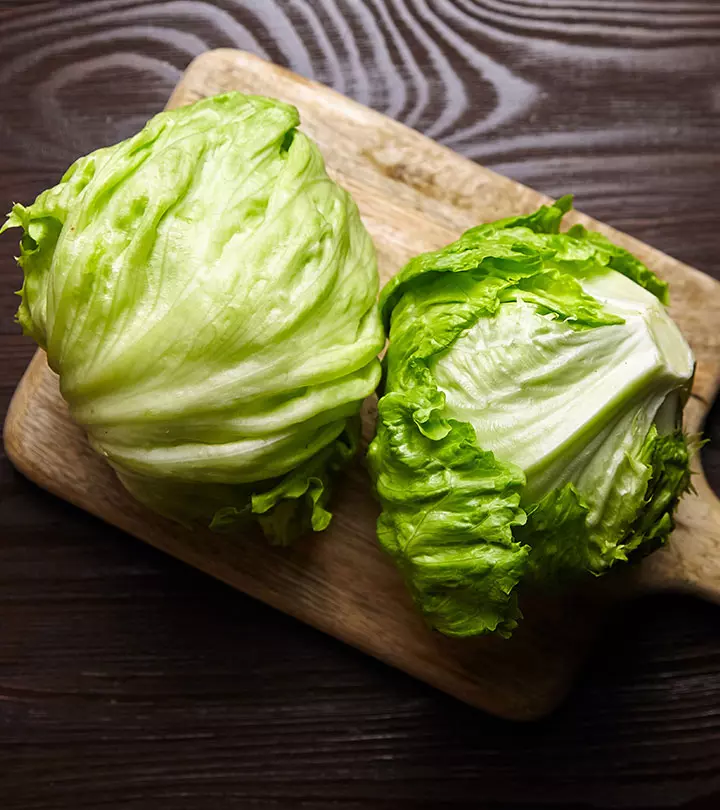
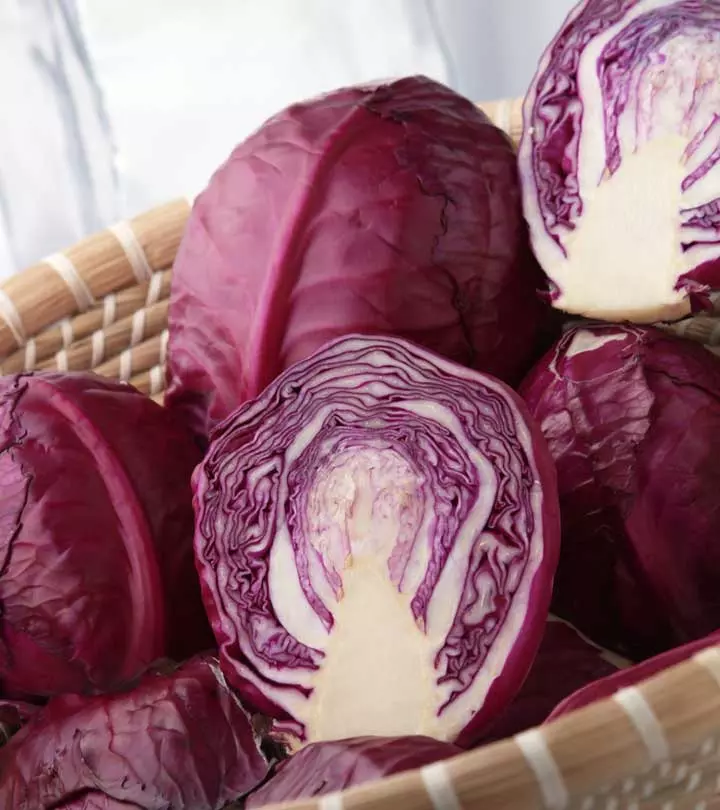

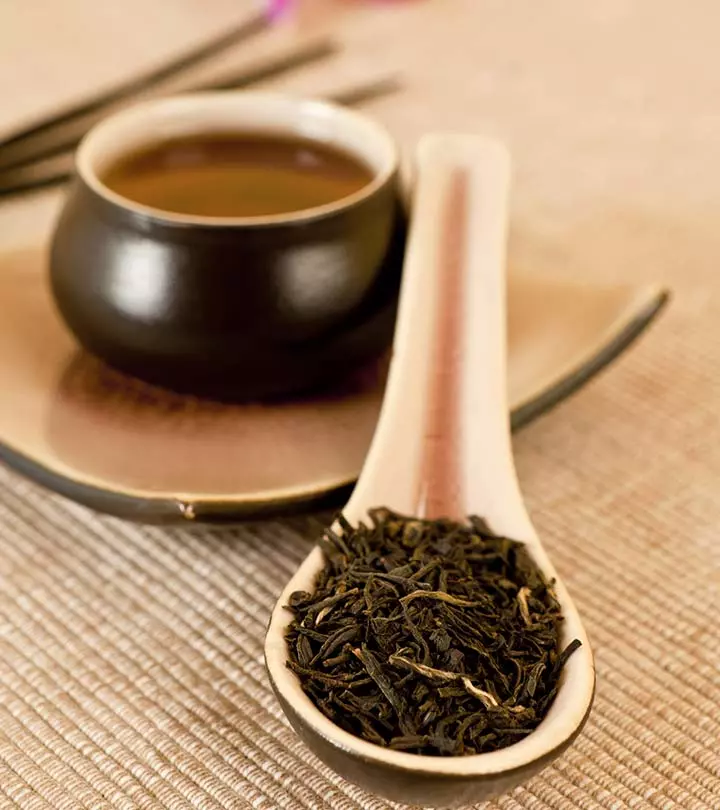
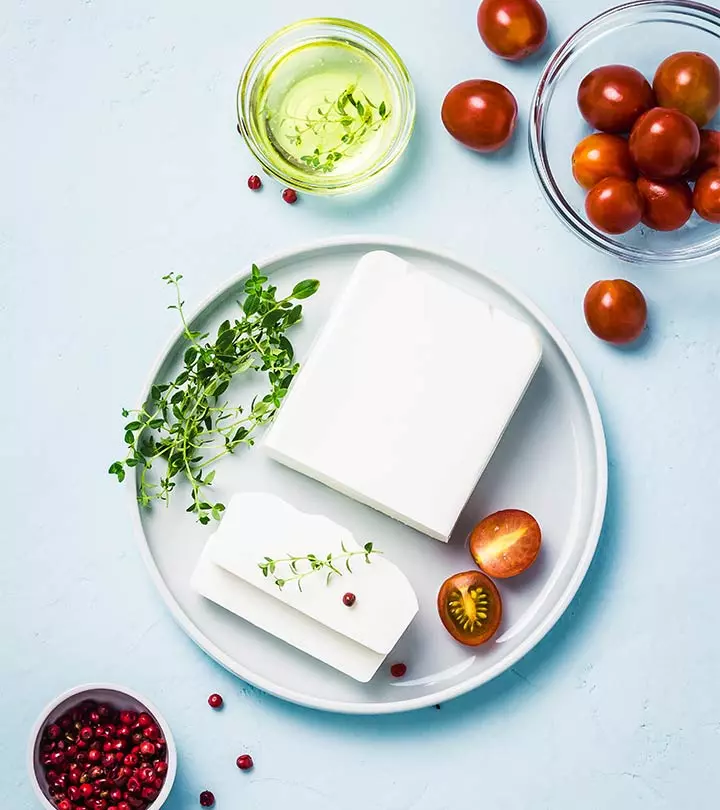
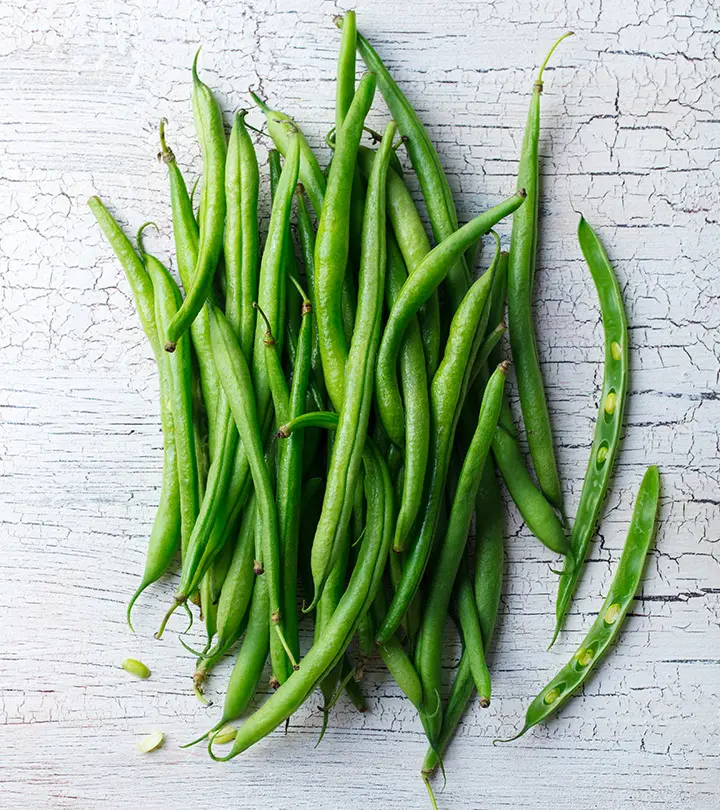
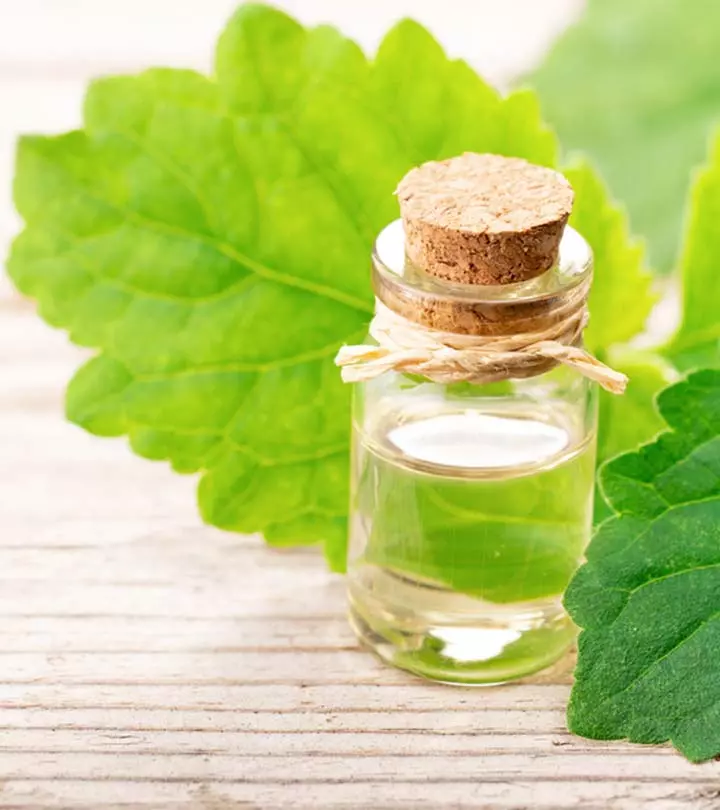
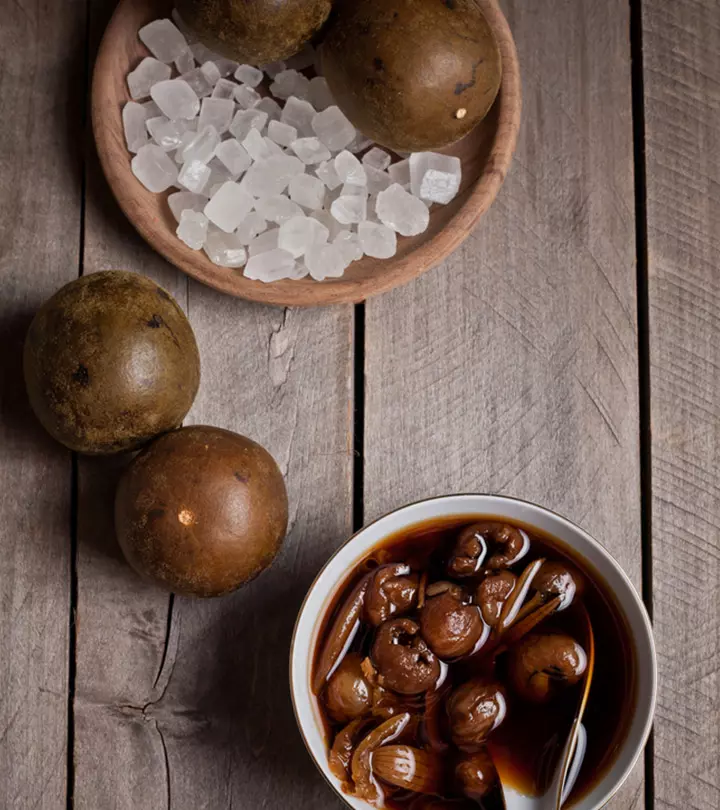

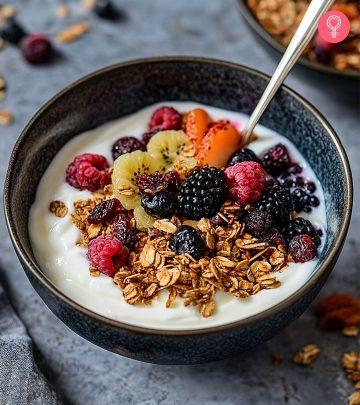
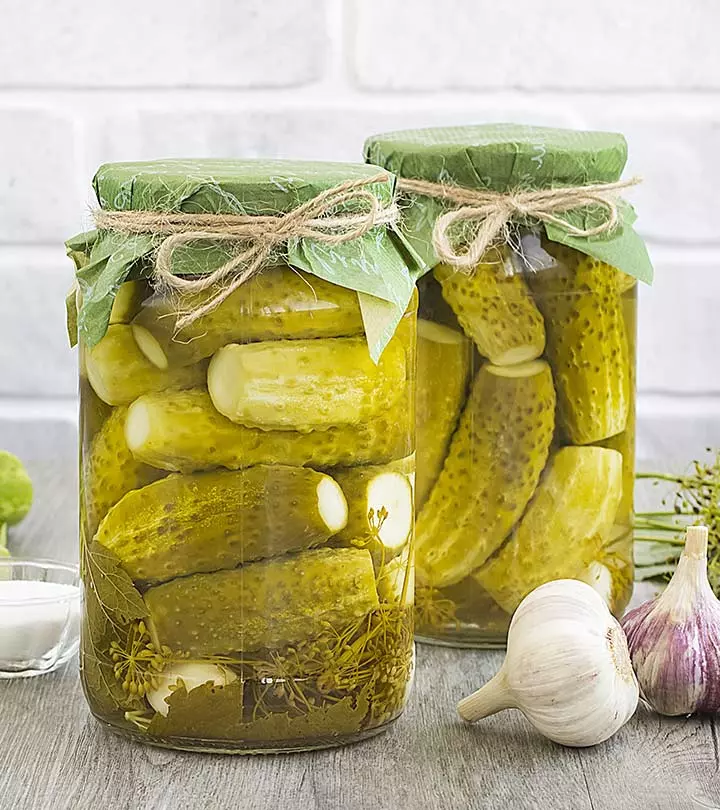

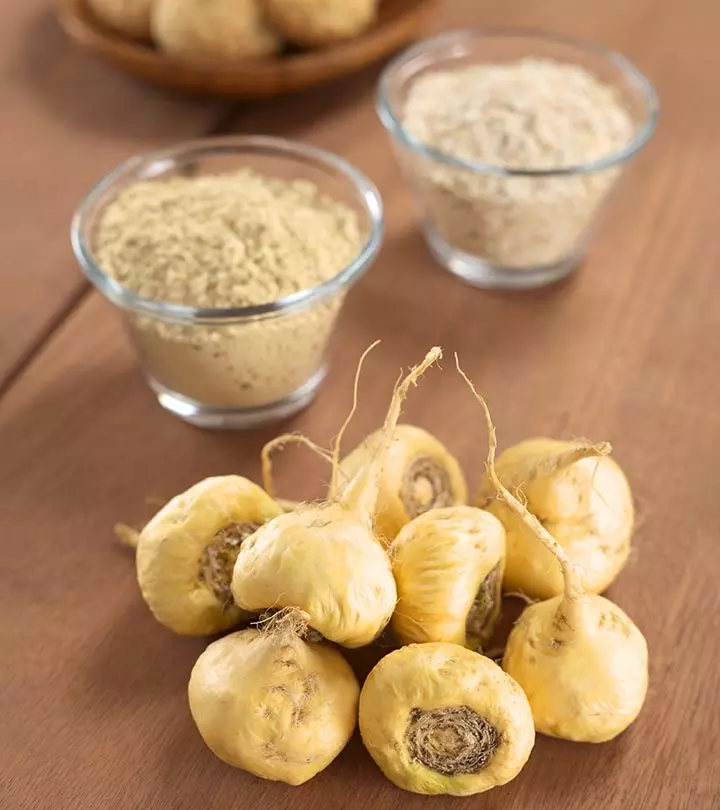
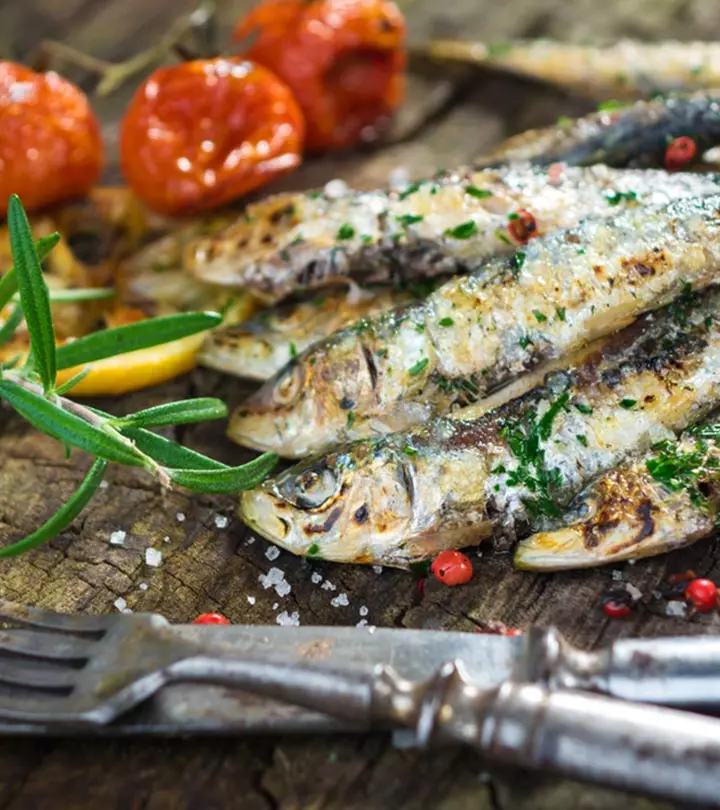
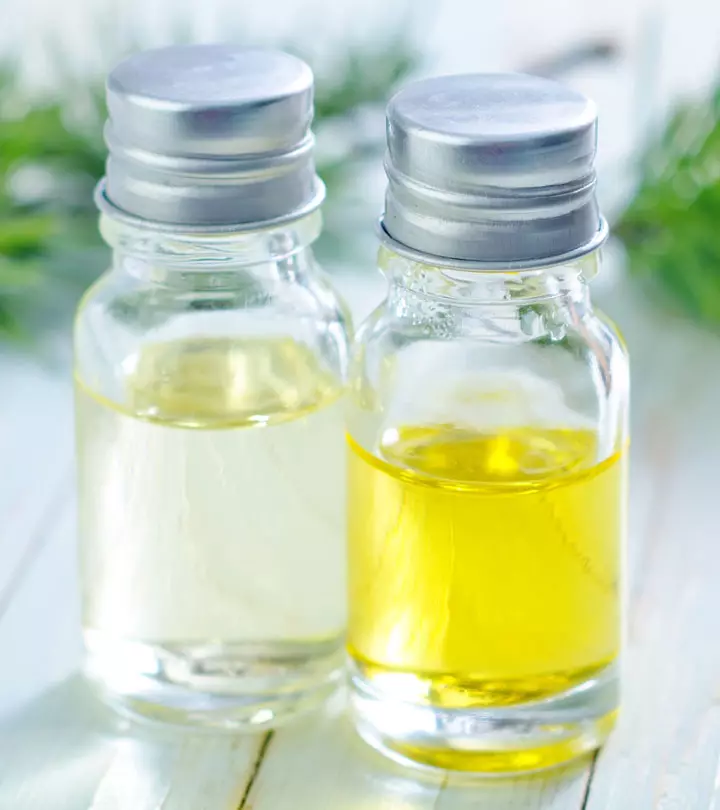
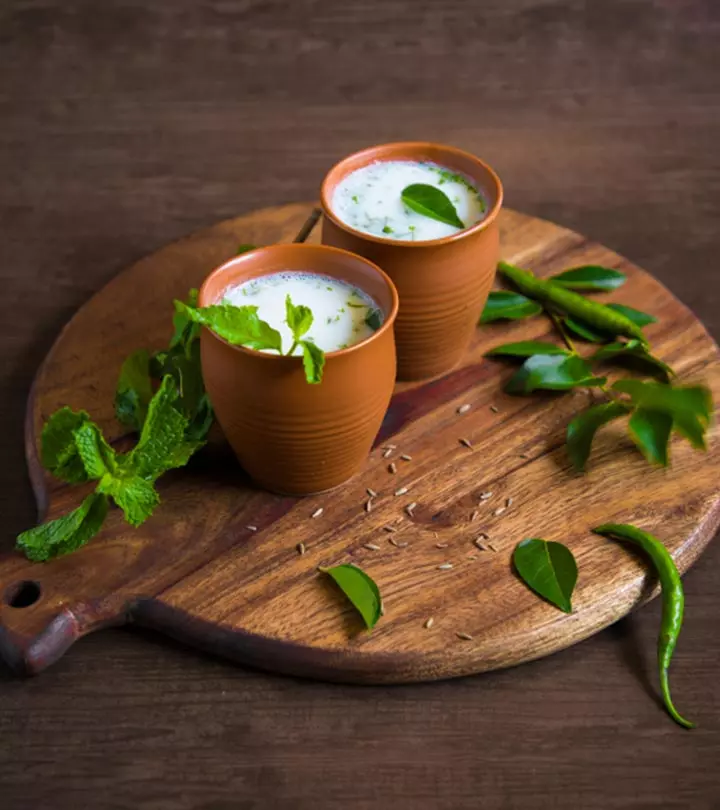
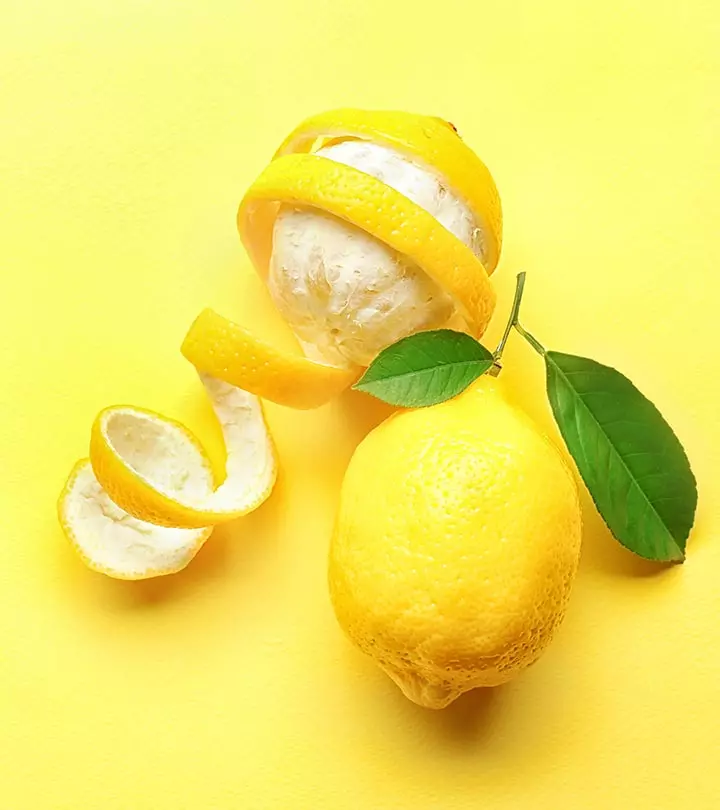
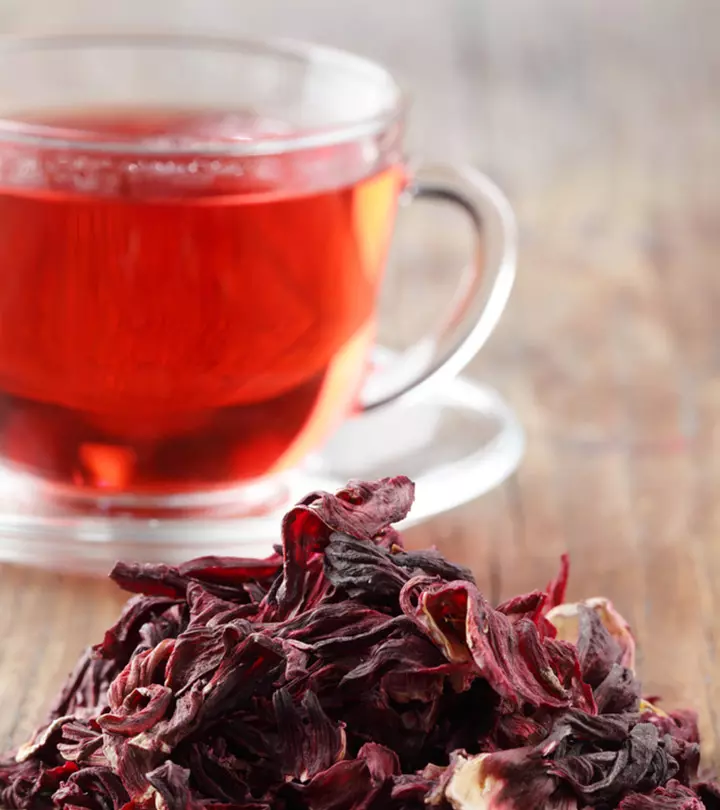
Community Experiences
Join the conversation and become a part of our empowering community! Share your stories, experiences, and insights to connect with other beauty, lifestyle, and health enthusiasts.